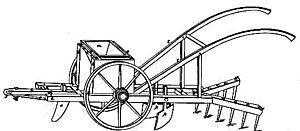Henry Blair (inventor) facts for kids
Quick facts for kids
Henry Blair
|
|
|---|---|

The drawing of the Seed-Planter by Blair used on the patent application in 1836.
|
|
| Born |
Henry Blaire
1807 Glen Ross, Maryland, United States
|
| Died | 1860 |
| Nationality | African American |
| Occupation | Inventor Farmers |
| Known for | The second black man to obtain a patent |
Henry Blair (1807–1860) was an important African American inventor. He was the second black person in the United States to receive a patent. A patent is a special legal document that protects an inventor's new idea. It means only the inventor can make, use, or sell their invention for a certain time.
Henry Blair: An Early American Inventor
Henry Blair was born in 1807 in Glen Ross, Maryland, in the United States. He was a successful farmer for many years. He created his inventions to make farming easier and more efficient.
His Smart Farming Inventions
Blair's first invention was called the Seed-Planter. He received a patent for it on October 14, 1834. This machine helped farmers plant more corn. It also used less effort and saved a lot of time.
On August 31, 1836, he got a second patent for a cotton planter. This machine worked by using two shovel-like blades to split the ground. A horse would pull the machine along. Behind the blades, a wheel-driven cylinder would drop seeds into the newly plowed soil.
Patents and Rights for Inventors
In the official patent records, Henry Blair was listed as a "colored man." This was very unusual for early patent documents. Blair could not read or write, so he signed his patent papers with an "x." It is believed that Henry Blair was a freedman. This means he was a black person who was not enslaved.
At the time Blair received his patents, the law allowed both freed people and enslaved people to get patents. However, this law was challenged in 1857. A slave-owner argued that he owned everything a slave created. This included any inventions.
This challenge led to a change in the law in 1858. The new law said that enslaved people were not citizens. Because of this, they could not hold patents. Henry Blair died in 1860. After the American Civil War ended in 1865, the law was changed again in 1871. This time, it granted patent rights to all men.
 | James B. Knighten |
 | Azellia White |
 | Willa Brown |

